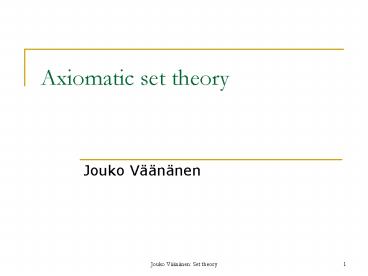Axiomatic set theory - PowerPoint PPT Presentation
1 / 17
Title: Axiomatic set theory
1
Axiomatic set theory
- Jouko Väänänen
2
Equivalent definition of sum
- ?0 ?
- ?(?1) (??)1
- ? ? lim?lt?(??)
3
Equivalent definition of product
- ??0 0
- ??(?1) (???)?
- ??? lim?lt?(???)
4
Definition of exponentiation
- ?0 1
- ??1 ????
- ?? lim?lt?(??)
5
Continuous functions on ordinals
- fOn?On is continuous if
- f(?)lim?lt? f(?)
- for all limit ordinals ?.
- f(?)?? is continuous
- ? ? lim?lt?(??)
- f(?) ? ? ? is continuous
- ??? lim?lt?(???)
- f(?)?? is continuous
- ?? lim?lt?(??)
6
Order-preserving functions on ordinals
- fOn?On is order-preserving if
- ?lt? ?f(?)ltf(?)
- for all ? and ?
- f(?)? ? is order-preserving
- ??? ? ??? ??
- f(?)? ? ? is order-preserving
- ??? ? ??? ? ???
- f(?)?? is order-preserving
- ??? ? ?? ? ??
7
Normal functions on ordinals
- fOn?On is normal if it is continuous and
order-preserving - f(?)?? is normal
- f(?)? ? ? is normal
- f(?)?? is normal
8
Exercise
- If fOn?On is normal, then
- f(lim ?lt? ??) lim?lt? f(??)
- for all increasing sequences (??)?lt?.
9
Fixed-point Theorem
- Every normal function has a fixed-point ?f(?).
- ?00
- ?n1f(?n) ??n
- ?limn ?n
- f(?)f(limn ?n) limn f(?n)
- limn ?n1?
10
Many fixed-points
- Every normal function has fixed-points
arbitrarily high - Given ?
- ?0 ?
- ?n1f(?n)? ?
- ?limn ?n ? ?
- f(?)f(limn ?n) limn f(?n)
- limn ?n1?
11
Fixed points of arithmetic functions
- For every ? there is ? such that ???.
- E.g. ????
- For every ? there is ? such that ????.
- E.g. ???
- For every ? there is ? such that ???.
- E.g. there are ? such that ???
12
Simultaneous fixed points
- Suppose f and g are normal. Then there is ? such
that ?f(?) and ?g(?). - ?00
- ?2n1f(?2n)??2n
- ?2n2g(?2n1) ??2n1
- ?limn ?n
- f(?)f(limn ?2n) limn f(?2n)
- limn ?2n1?
- g(?)g(limn ?2n1) limn g(?2n1)
- limn ?2n2?
13
Ordinal substraction
- For all ? and ? such that ?lt? there is a unique ?
such that ???
?
?
?
14
More formal proof
- Let ? be the least ? such that ??gt?.
- Case 1 ? is a limit ordinal. So ???? for all
?lt?. But then ??lim?lt? ?? ??lt? ????, that
is, ????, a contradiction. - Case 2 ? is a successor ordinal ?1. Since ?lt?,
????. But if ??lt?, then ????, a contradiction.
So ???. - Uniqueness by the Cancellation Law.
15
Properties of exponentiation
- ????????
- (??)?????
16
Proof of ????????
- ????0 ???1?? ??0
- ?????1 ??????? ????? ?(??)1??(?1)
- ????? ???lim?lt?(??) lim?lt? ????? lim?lt? ???
- Claim lim?lt? ??? lim?lt?? ?? (???).
- If ?lt?, then ??lt ??, so ???? ???.
- Suppose ?lt??. If ???, then ??????lim?lt? ???.
- Assume then ?lt?, e.g. ? ??. Then ?lt?. Now ??
??? ? lim?lt? ???.
17
Limit ordinals are divisible by ?
- If ? is a limit ordinal, then ???? for some ?.
- Proof Let ? be the smallest ? such that ?lt???
- Case 1 ? is a limit ordinal. If ?lt?, then ?????.
Hence ???lim?lt??????, a contradiction. - Case 2 ? ?1. So ?????. If ???lt?, then ???
??(?1) ??????, since ? is a limit ordinal!
This is a contradiction. Hence in fact ????. QED































